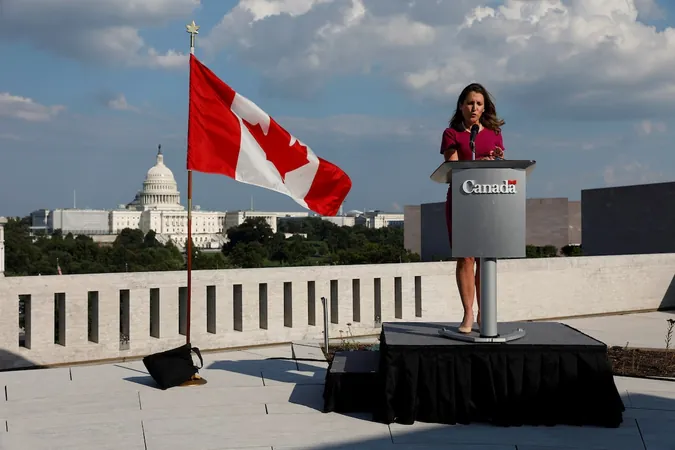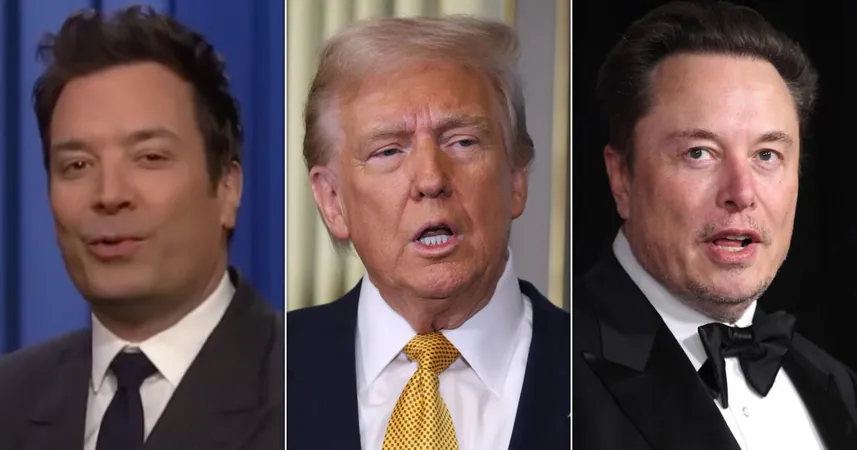
The Steel Behind Chrystia Freeland's Negotiation Stamina: How Canada’s 'America Whisperer' Stood Up Against Trump
2024-12-21
Author: Emma
Introduction
In the early months of Donald Trump’s presidency, Canadian jobs faced unprecedented threats as the new administration implemented policies that directly impacted cross-border trade. One pivotal moment occurred in 2017 when Trump declared that U.S. oil and gas pipelines must utilize American-made materials exclusively. This move put Canadian steel, particularly from the Regina-based Evraz factory, in jeopardy.
Freeland's Tactical Acumen
At the forefront of Canada's response was Chrystia Freeland, then the Minister of Foreign Affairs. Freeland approached U.S. Commerce Secretary Wilbur Ross to request a halt to Trump's restrictive policy. Ross, however, was non-committal. Demonstrating her tactical acumen, Freeland informed Ross that she was meeting with Dina Powell, a White House advisor who was known to have a more amicable rapport with Trump. That clever maneuver prompted Ross to communicate Freeland’s concerns to Trump, eventually leading to a policy reversal allowing Canadian steel to be used in U.S. pipelines.
Freeland's Resilience in Negotiations
This episode was just the beginning of Freeland's display of strategic resilience as Canada’s chief negotiator during the tumultuous trampling of trade agreements. Over the following years, she emerged as a prominent figure in the fraught negotiations that resulted in the renegotiated U.S.-Mexico-Canada Agreement (USMCA), all while navigating the trade war instigated by Trump’s tariffs on steel and aluminum.
Her Resignation and Trump's Reaction
As Freeland announced her resignation as Deputy Prime Minister and Finance Minister amid disagreements with Prime Minister Justin Trudeau regarding how to tackle the looming threat of 25% tariffs on all Canadian goods, reactions were swift, particularly from Trump himself. “Her behavior was totally toxic... She will not be missed!!!,” Trump wrote on social media, underscoring the contentious relationship that defined her tenure.
Mixed Perceptions of Freeland's Approach
Despite mixed perceptions about her confrontational approach—some regarded her as an impediment, while others applauded her aggressive defense of Canadian interests—one thing is clear: Freeland's tenure was marked by a determination to stand firm against the U.S. administration's often hardline tactics. In negotiations, she formed a united front with Mexico's chief negotiator to successfully block many of Trump’s protectionist demands, including the removal of vital dispute-resolution mechanisms and restrictions that would limit Canadian and Mexican access to U.S. government contracts.
Support from Mexican Negotiators
Kenneth Smith Ramos, Mexico's USMCA negotiator, emphasized Freeland's strength in negotiations, stating she effectively argued for the preservation of certain rights and provisions on environmental standards and gender equality, even when faced with resistance.
Criticism of Freeland's Firm Approach
However, Freeland's firm approach was not without its critics. Trump’s team often expressed frustration regarding her tactics, claiming they were stalled for 16 months, and at times, they sought to bypass her for more agreeable channels within the Canadian government. Notably, even Trump’s son-in-law, Jared Kushner, portrayed her as obstructionist, contrasting her effectiveness with others in Trudeau's inner circle who sought faster resolutions.
Calculated Concessions
Despite this, Freeland's strategy was characterized as a calculated withholding of concessions until the final stages of negotiations, a tactic that bore fruit in the end. The USMCA maintained much of the framework established by NAFTA, and tariffs on Canadian steel and aluminum were lifted without Canada conceding major points.
Concerns for Canada's Future Negotiations
As speculations mount over Canada’s fragile trade relations under a potential new Trump administration, analysts are questioning whether the loss of Freeland's experience will put Canada at a disadvantage in future negotiations. Laura Dawson, director of the Future Border Coalition, expressed this concern, affirming that Freeland's deep understanding of complex trade issues made her a forceful advocate for Canadian interests.
Freeland's Legacy in Negotiations
John Bolton, former National Security Advisor, remarked on Freeland's tactics, noting how effective negotiation with Trump often danced between aggression and concession, a delicate balance that Freeland managed with notable skill.
Conclusion
While Chrystia Freeland's time as a primary negotiator raises questions about Canada's future approach to U.S. relations, her legacy as a formidable negotiator—brimming with both toughness and strategic insight—has firmly cemented her role in the annals of Canadian-American diplomacy. Now, as Canada braces for potential economic challenges, her absence from the negotiating table could feel even more pronounced.









 Brasil (PT)
Brasil (PT)
 Canada (EN)
Canada (EN)
 Chile (ES)
Chile (ES)
 España (ES)
España (ES)
 France (FR)
France (FR)
 Hong Kong (EN)
Hong Kong (EN)
 Italia (IT)
Italia (IT)
 日本 (JA)
日本 (JA)
 Magyarország (HU)
Magyarország (HU)
 Norge (NO)
Norge (NO)
 Polska (PL)
Polska (PL)
 Schweiz (DE)
Schweiz (DE)
 Singapore (EN)
Singapore (EN)
 Sverige (SV)
Sverige (SV)
 Suomi (FI)
Suomi (FI)
 Türkiye (TR)
Türkiye (TR)